小升初 英语语法提升课件-过去时 通用版 (共18张PPT)
文档属性
| 名称 | 小升初 英语语法提升课件-过去时 通用版 (共18张PPT) |  | |
| 格式 | pptx | ||
| 文件大小 | 3.1MB | ||
| 资源类型 | 教案 | ||
| 版本资源 | 通用版 | ||
| 科目 | 英语 | ||
| 更新时间 | 2021-02-03 09:33:05 | ||
图片预览

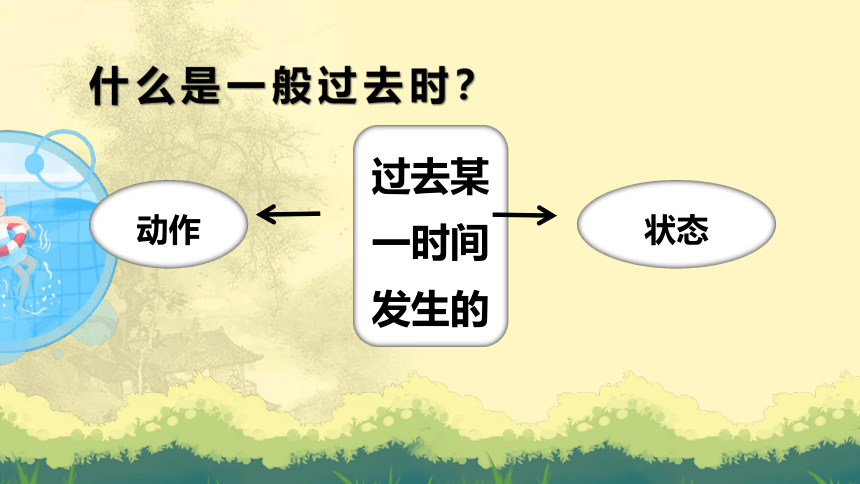
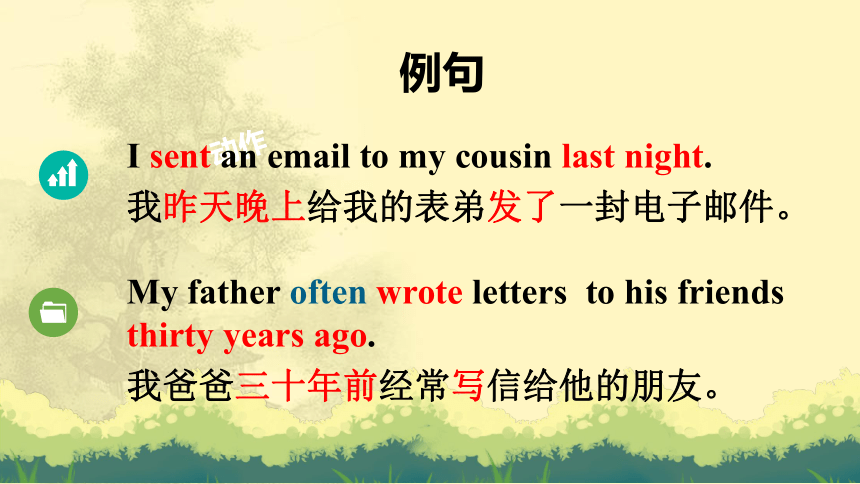
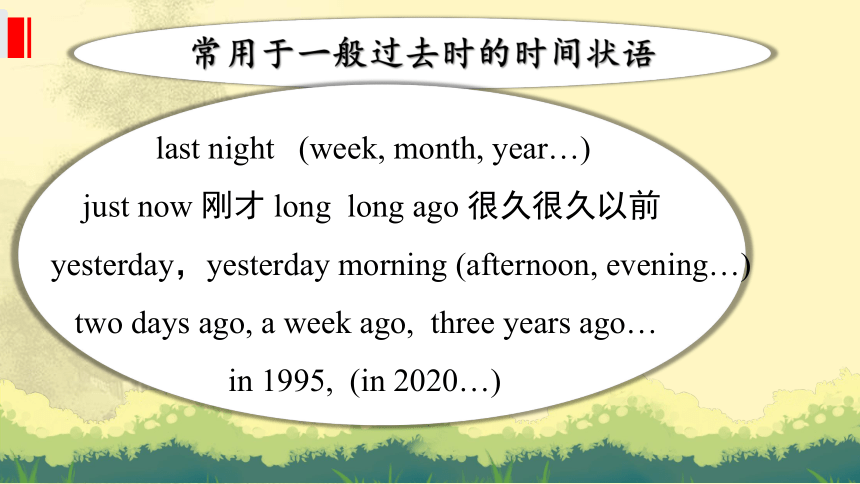
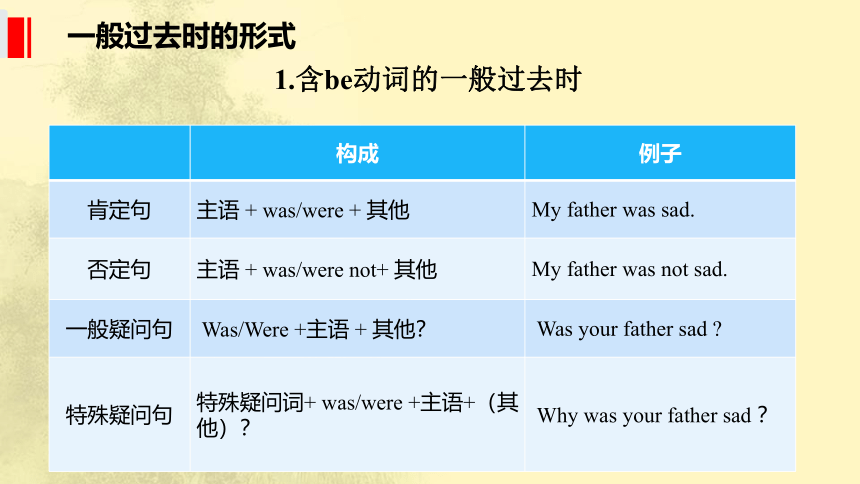
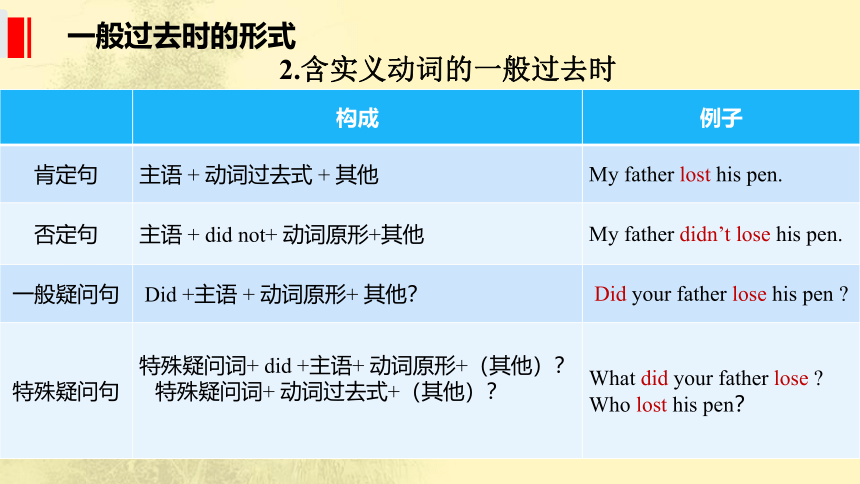
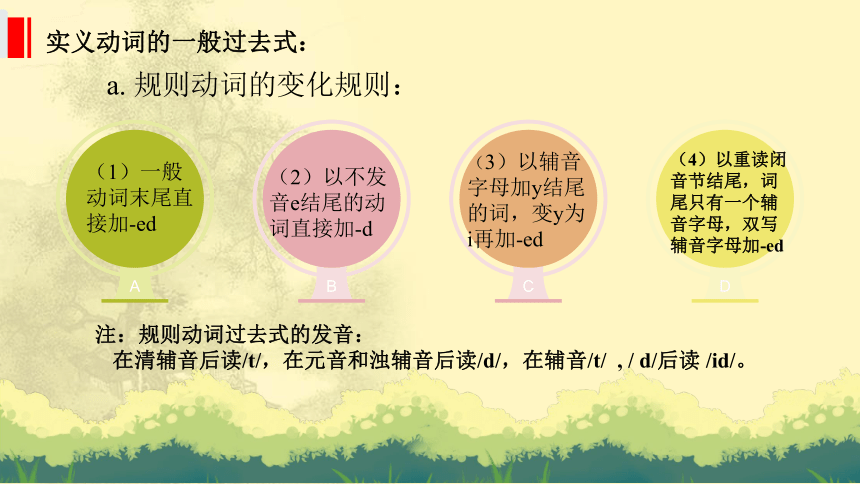
文档简介
小升初语法提升
一般过去时
过去某一时间发生的
状态
动作
什么是一般过去时?
动作
My father often wrote letters to his friends thirty years ago.
我爸爸三十年前经常写信给他的朋友。
I sent an email to my cousin last night.
我昨天晚上给我的表弟发了一封电子邮件。
例句
常用于一般过去时的时间状语
last night (week, month, year…)
just now 刚才 long long ago 很久很久以前
yesterday,yesterday morning (afternoon, evening…)
two days ago, a week ago, three years ago…
in 1995, (in 2020…)
{5C22544A-7EE6-4342-B048-85BDC9FD1C3A}
构成
例子
肯定句
主语 + was/were + 其他
My father was sad.
否定句
主语 + was/were not+ 其他
My father was not sad.
一般疑问句
Was/Were +主语 + 其他?
Was your father sad ?
特殊疑问句
特殊疑问词+ was/were +主语+(其他)?
Why was your father sad ?
1.含be动词的一般过去时
一般过去时的形式
{5C22544A-7EE6-4342-B048-85BDC9FD1C3A}
构成
例子
肯定句
主语 + 动词过去式 + 其他
My father lost his pen.
否定句
主语 + did not+ 动词原形+其他
My father didn’t lose his pen.
一般疑问句
Did +主语 + 动词原形+ 其他?
Did your father lose his pen ?
特殊疑问句
特殊疑问词+ did +主语+ 动词原形+(其他)?
特殊疑问词+ 动词过去式+(其他)?
What did your father lose ? Who lost his pen?
2.含实义动词的一般过去时
一般过去时的形式
A
B
C
D
实义动词的一般过去式:
a. 规则动词的变化规则:
(1)一般动词末尾直接加-ed
(2)以不发音e结尾的动词直接加-d
(3)以辅音字母加y结尾的词,变y为 i再加-ed
(4)以重读闭音节结尾,词尾只有一个辅音字母,双写辅音字母加-ed
注:规则动词过去式的发音:
在清辅音后读/t/,在元音和浊辅音后读/d/,在辅音/t/ , / d/后读 /id/。
实义动词的一般过去式:
b. 不规则动词变化需参看不规则动词表逐一熟记。
常见不规则动词
Infinitive Past tense
am / is was
are were
begin began
break broke
see saw
go went
buy bought
can could
Infinitive Past tense
meet met
come came
do did
sing sang
drink drank
run ran
eat ate
fall fell
一般过去时
考题例析
单项选择: My sister ________some tea last night?
A. drink B. drinked C. drank
方法点拨:根据 last night这个时间状语,判断动词用过去式。
C
一般过去时
考题例析
单项选择: Sam always goes to school early ,but he________ late for school this morning .
A. is B. does C. were D . was
方法点拨: this morning 用于一般过去时。
D
一般过去时
考题例析
单项选择: ______ your mother busy yesterday?
Yes, she ______ a lot of housework.
A. Was ; did B. Was ; was C. Did ; did
方法点拨:1.busy为形容词,前面用be动词;
2.yesterday这个时间状语,判断动词用过去式;
3.your mother 为三单,所以用Was;
4. 做家务为do housework,但这里应用do的过去式did。
A
过去式
get → _______
go → _______
can → _______
does → _______
find → _______
will → _______
had
went
could
did
found
would
have → ______
give → _______
ride → _______
play → _______
sing → _______
listen → _______
sang
got
listened
gave
rode
played
按要求完成下列句子。
1. Lucy did her homework at home.(改为否定句)
Lucy _______ _______ her homework at home.
2. He found some meat in the fridge.(改为一般疑问句)
______ he _____ ______ meat in the fridge?
3. She stayed there for a week.(对画线部分提问)
______ ______ _____ she _____ there?
4. There was some orange juice in the cup.(改为一般疑问句)
_____ there _____ orange juice in the cup?
didn’t do
Did find any
How long did stay
Was any
Exercise
5. I was a student.(改为否定句)
I _______ _______ a student.
6. I ate a cake for breakfast this morning .(改为一般疑问句)
______ you _____ a cake for breakfast this morning ?
7. The man showed the king his new clothes .(对画线部分提问)
______ ______ the man_____ the king ?
8. There isn’t any meat in the fridge.(用last Sunday 改写句子)
There _____ any meat in the fridge ______ ______ .
was not
Did eat
What did show
wasn’t last Sunday
Exercise
单项选择。
1. He usually goes to school by bus, but yesterday he ????????a taxi.
A. takes?????? B. took??????? C. gets on????? D. got on
2. I ???????some books about American history from our library
last week.
A. borrowed??? B. took???? C. brought???? D. lent
3. It was warm, so I ??????my coat.
A. put on???? B. put up???? C. took off???? D. take off
B
A
C
4. The window was open and a bird ??????into my room.???
A. flies???? B. flys????? C. flyed????? D. flew
5. Both my parents ??????born in Tianjin and I ???????born in Shanghai.
A. are, am???? B. was, were????
C. were, was?????? D. did, did
D
C
练习
翻译题。
1. 他在那儿待了两个月。
2. 你上周六做什么了?
3. 他们上周末看电视了吗?
4. 你的寒假怎么样?
5. 她昨天没去上学。
答案:
1. He stayed there for two months.
2. What did you do last Saturday ?
3. Did they watch TV last weekend?
4. How was your winter holiday?
5. She didn’t go to school yesterday.
Thank you
一般过去时
过去某一时间发生的
状态
动作
什么是一般过去时?
动作
My father often wrote letters to his friends thirty years ago.
我爸爸三十年前经常写信给他的朋友。
I sent an email to my cousin last night.
我昨天晚上给我的表弟发了一封电子邮件。
例句
常用于一般过去时的时间状语
last night (week, month, year…)
just now 刚才 long long ago 很久很久以前
yesterday,yesterday morning (afternoon, evening…)
two days ago, a week ago, three years ago…
in 1995, (in 2020…)
{5C22544A-7EE6-4342-B048-85BDC9FD1C3A}
构成
例子
肯定句
主语 + was/were + 其他
My father was sad.
否定句
主语 + was/were not+ 其他
My father was not sad.
一般疑问句
Was/Were +主语 + 其他?
Was your father sad ?
特殊疑问句
特殊疑问词+ was/were +主语+(其他)?
Why was your father sad ?
1.含be动词的一般过去时
一般过去时的形式
{5C22544A-7EE6-4342-B048-85BDC9FD1C3A}
构成
例子
肯定句
主语 + 动词过去式 + 其他
My father lost his pen.
否定句
主语 + did not+ 动词原形+其他
My father didn’t lose his pen.
一般疑问句
Did +主语 + 动词原形+ 其他?
Did your father lose his pen ?
特殊疑问句
特殊疑问词+ did +主语+ 动词原形+(其他)?
特殊疑问词+ 动词过去式+(其他)?
What did your father lose ? Who lost his pen?
2.含实义动词的一般过去时
一般过去时的形式
A
B
C
D
实义动词的一般过去式:
a. 规则动词的变化规则:
(1)一般动词末尾直接加-ed
(2)以不发音e结尾的动词直接加-d
(3)以辅音字母加y结尾的词,变y为 i再加-ed
(4)以重读闭音节结尾,词尾只有一个辅音字母,双写辅音字母加-ed
注:规则动词过去式的发音:
在清辅音后读/t/,在元音和浊辅音后读/d/,在辅音/t/ , / d/后读 /id/。
实义动词的一般过去式:
b. 不规则动词变化需参看不规则动词表逐一熟记。
常见不规则动词
Infinitive Past tense
am / is was
are were
begin began
break broke
see saw
go went
buy bought
can could
Infinitive Past tense
meet met
come came
do did
sing sang
drink drank
run ran
eat ate
fall fell
一般过去时
考题例析
单项选择: My sister ________some tea last night?
A. drink B. drinked C. drank
方法点拨:根据 last night这个时间状语,判断动词用过去式。
C
一般过去时
考题例析
单项选择: Sam always goes to school early ,but he________ late for school this morning .
A. is B. does C. were D . was
方法点拨: this morning 用于一般过去时。
D
一般过去时
考题例析
单项选择: ______ your mother busy yesterday?
Yes, she ______ a lot of housework.
A. Was ; did B. Was ; was C. Did ; did
方法点拨:1.busy为形容词,前面用be动词;
2.yesterday这个时间状语,判断动词用过去式;
3.your mother 为三单,所以用Was;
4. 做家务为do housework,但这里应用do的过去式did。
A
过去式
get → _______
go → _______
can → _______
does → _______
find → _______
will → _______
had
went
could
did
found
would
have → ______
give → _______
ride → _______
play → _______
sing → _______
listen → _______
sang
got
listened
gave
rode
played
按要求完成下列句子。
1. Lucy did her homework at home.(改为否定句)
Lucy _______ _______ her homework at home.
2. He found some meat in the fridge.(改为一般疑问句)
______ he _____ ______ meat in the fridge?
3. She stayed there for a week.(对画线部分提问)
______ ______ _____ she _____ there?
4. There was some orange juice in the cup.(改为一般疑问句)
_____ there _____ orange juice in the cup?
didn’t do
Did find any
How long did stay
Was any
Exercise
5. I was a student.(改为否定句)
I _______ _______ a student.
6. I ate a cake for breakfast this morning .(改为一般疑问句)
______ you _____ a cake for breakfast this morning ?
7. The man showed the king his new clothes .(对画线部分提问)
______ ______ the man_____ the king ?
8. There isn’t any meat in the fridge.(用last Sunday 改写句子)
There _____ any meat in the fridge ______ ______ .
was not
Did eat
What did show
wasn’t last Sunday
Exercise
单项选择。
1. He usually goes to school by bus, but yesterday he ????????a taxi.
A. takes?????? B. took??????? C. gets on????? D. got on
2. I ???????some books about American history from our library
last week.
A. borrowed??? B. took???? C. brought???? D. lent
3. It was warm, so I ??????my coat.
A. put on???? B. put up???? C. took off???? D. take off
B
A
C
4. The window was open and a bird ??????into my room.???
A. flies???? B. flys????? C. flyed????? D. flew
5. Both my parents ??????born in Tianjin and I ???????born in Shanghai.
A. are, am???? B. was, were????
C. were, was?????? D. did, did
D
C
练习
翻译题。
1. 他在那儿待了两个月。
2. 你上周六做什么了?
3. 他们上周末看电视了吗?
4. 你的寒假怎么样?
5. 她昨天没去上学。
答案:
1. He stayed there for two months.
2. What did you do last Saturday ?
3. Did they watch TV last weekend?
4. How was your winter holiday?
5. She didn’t go to school yesterday.
Thank you
